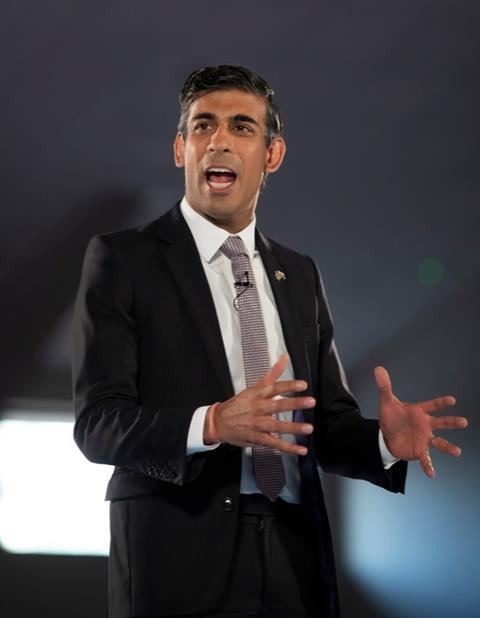With Jeremy Hunt reportedly staying on as chancellor, the incoming PM looks to be setting a course for financial stabilisation. But is UK plc really bound for calmer waters? Daniel Gayne reports
After a long weekend of wrangling for the support of Tory MPs, it is Rishi Sunak who will step into Liz Truss’ shoes as the UK’s third prime minister of the year.
For a moment, it had looked as if Boris Johnson might pull off an audacious return to No 10 that would most likely have seen the political chaos of recent weeks continue. Numerous Tory MPs were reportedly mulling the option of defection if the ex-PM had prevailed.

Many in construction, and UK business more broadly, will be grateful that this prospect was avoided, and there is cautious optimism that a Sunak premiership will bring much-craved stability to Downing Street.
“What we require as a sector from our government is stability, and competence – to date all we have had is chaos and carnage,” says Richard Steer, chair of Gleeds.
He describes Sunak as a “vast improvement on his two predecessors”, emphasising that the UK “must move from being regarded as a global laughing stock to being seen as a strong, credible member of the G7 and a worthy home for investors”.
The lack of a membership vote – and therefore of a real campaign – means that Sunak will come to power without having set out any explicit ideological agenda.
Perhaps the biggest indication of his intentions are reports that Jeremy Hunt, who is a Sunak backer, will be kept on as chancellor at the Treasury.
At first glance, the two seem to be a good fit – recent weeks have seen Hunt reverse most of Kwasi Kwarteng tax cuts, largely returning to the course set by Sunak when he himself was chancellor, which included a rise in corporation tax from 19 to 25%.
The scrapping of Sunak’s planned National Insurance increase is one of the few Kwarteng-era policies that have thus far survived Hunt’s cuts and it will be interesting to see whether the new PM will prompt the dumping of this policy too.
> Also read: IR35 reforms and tax cuts binned in new chancellor’s £32bn mini-budget climbdown
During the summer leadership campaign, Sunak had warned that any cuts to tax would have to wait until inflation was under control. With the deterioration of the economy that took place under his predecessor’s short tenure, it may be a while before we see any of Sunak’s planned cuts, which included reducing investment tax and cutting the basic rate of income tax within seven years.
Given the government’s commitment to an expensive energy relief package – for at least the next six months – it also remains to be seen whether Sunak’s summer campaign promise to scrap VAT on energy will be implemented.
Despite his major role in UK politics in recent years, Sunak remains something of an enigma – a self-proclaimed free-marketeer nevertheless responsible for furlough, one of the biggest peacetime interventions in the economy. He is a Leave supporter surrounded by centrist advisors.
If there is any consensus on the man it is that he is more of a pragmatist than an ideologue and the present economic circumstances mean the UK could be in for another era of austerity.
> Also read: RIBA warns of slump in workloads as political chaos batters sector
Simon Rawlinson, head of strategic research and insight at Arcadis, says that while construction “must be ready” for some programme cuts and tax increases, there is reason to be “cautiously optimistic”.
He notes that Sunak’s time in the Treasury “coincided with the UK investing record amounts in infrastructure, even during the depths of the pandemic”, with the fiscal remit of the National Infrastructure Commission for 2025 to 2055 increased to 1.3% of GDP during his last year in office.
“Both he and his likely chancellor, Jeremy Hunt, understand the role of capital investment as part of the growth and levelling-up agenda,” says Rawlinson.
In his 28 months as chancellor, Sunak’s budgets were mostly warmly received by the construction industry, particularly his setting up of the UK Infrastructure Bank and the £7.1bn Home Building Fund.
In his last spring statement, he set out plans to temporarily remove VAT from energy-saving products such as solar panels and wind turbines and brought forward green reliefs for business rates, which would cover capital expenditure on machinery for onsite renewables.
He has also stated that he wants the UK to get to net zero by 2050 and has been an advocate for offshore wind, though some in the built environment criticised his treasury, which reportedly blocked greater investment in retrofit in last year’s energy security strategy.
Sunak’s more than 200 nominations – more than half of Conservative MPs – comprise an impressively broad church, with arch-Remainers such as Simon Hoare sitting alongside die-hard Brexiteers like Steve Baker.
But despite receiving the endorsement of right-wing darlings such as Suella Braverman, Priti Patel and Kemi Badenoch, this is still the man blamed by many in the party for toppling Johnson in July and, as recent history has proven, it does not take much for the wheels to fall off the Tory wagon.
Steer fears that it is “neither the markets nor opposition that will prove to be [Sunak’s] sword of Damocles”, but rather “the members of his own party who seem to prioritise personal politics above financial pragmatism” that he will need to watch out for.
It is easy to forget that Sunak has been an MP for only seven years and a cabinet minister for just two – and though, given the nature of those years, it would be difficult to call him inexperienced as a politician, his political savvy will surely be tested by a stubbornly fractious parliamentary party.
















No comments yet